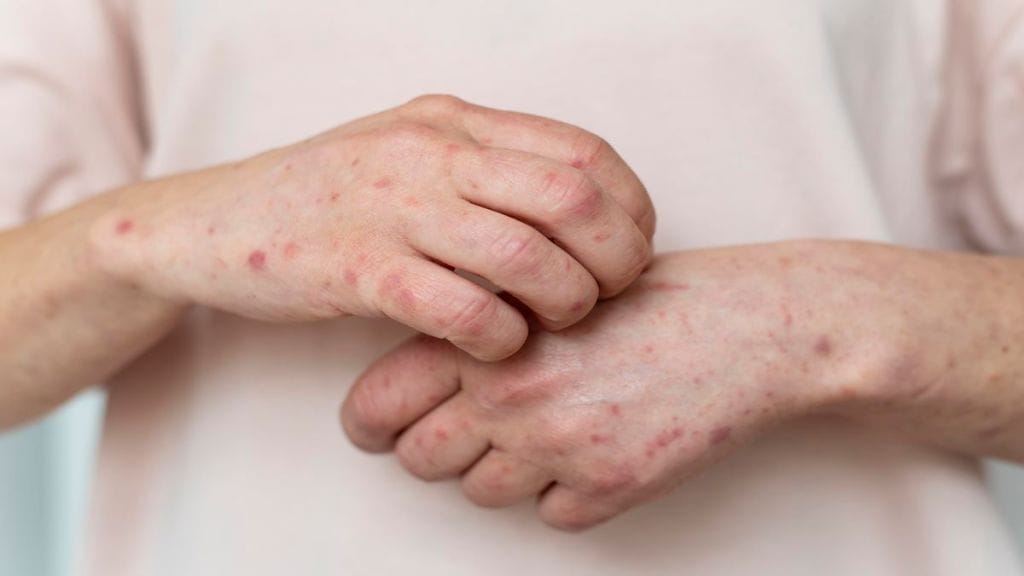Atopic Dermatitis (AD) is a common chronic dermatological condition and it can affect people from all age groups. According to a study published in The Indian Journal of Dermatology, AD has the highest disease burden based on disability-adjusted life-years among dermatological disorders.
Although, the skin disease affects approximately 10 percent of adults and up to 20 percent of children in high-income countries, there has been steady rise in the number of cases in India due to various environmental factors.
“Atopic dermatitis, a severe form of eczema, causes the skin to become red, itchy and inflamed over time. It could be influenced by genetics as well as the environment. These factors have the potential to degrade the skin’s barrier, allowing allergens and other irritants to penetrate and inflame the skin,” Dr Abin Abraham Itty, Consultant Dermatologist & HOD, VPS Lakeshore Hospital, Kochi & The Skin Health Clinic, Kolenchery told Financial Express.com.
As the chronic diseases doesn’t have a fixed set of clinical symptoms and its severity and course are dependent on environmental and genetic factors, it is called a Hetergenous Condition.
According to Dr. Kiran V. Godse, Professor of Dermatology at the Department of Dermatology, D.Y.Patil University & School of Medicine, Navi Mumbai, the exact reason for its occurrence is not known.
“Hormonal influences like androgens and other factors in girls emerge during adolescence, typically between ages 12 and 18, making them an unlikely contributor. Certain genetic factors might play a role, with ongoing efforts focused on identifying numerous genes involved in this context. Apart from this, other genes such as loricrin and involucrin genes, along with potential genetic factors like HLA (human leukocyte antigen), could potentially contribute to the condition’s severity in girls. However, it’s important to note that hormonal factors are unlikely to play a significant role in this regard,” Dr. Godse told Financial Express.com.
What are the challenges that patients with Eczema face in India?
Dr. Godse revealed that many people in India, including healthcare professionals, have limited awareness and understanding of atopic eczema. This can lead to misdiagnosis or delayed diagnosis, he said.
Meanwhile, Dr. Itty told Financial Express.com that other than lack of awareness, patients often struggle due to exorbitant expense of medical care, lack of access to healthcare or customized skincare.
He also pointed out that the social stigma associated with the condition may lead to social isolation and therapies to deal with them.
“…More has to be done to address these issues, including public education about atopic eczema and boosting awareness and increasing access to individualized AD care. This is only achievable by having a comprehensive understanding of each patient’s unique lifestyle, disease severity, co-morbidities, social support system, needs, and preferences,” Dr. Itty told Financial Express.com.
Atopic dermatitis appears as a rash on the skin, which can cover much of the body, and can cause intense itching, skin dryness and redness. Anil Raina, General Manager, Sanofi Specialty Care, India told Financial Express.com that Itch is one of the most burdensome symptoms for patients and can be severely debilitating, with significantly impaired quality of life, including disrupted sleep, increased anxiety, stigma of social isolationand depression symptoms.
“There is a need to create an enhanced awareness on atopic dermatitis as a disease and the patients need to visit their dermatologists to enquire about newer therapies that are available in the country now,” Raina told Financial Express.com.
In July this year, Sanofi Healthcare India Pvt. Ltd. announced that they have obtained marketing approval for Dupixent (dupilumab). This is the first biologic medicine for the treatment of moderate-to-severe atopic dermatitis in adults whose disease is not adequately controlled with topical prescription therapies.
Reportedly, it is the first and only biologic medicine in India that has shown significantly improved disease signs, symptoms, and quality of life measures.
How to Atopic Dermatitis is treated?
Dr. Itty informed that Methotrexate, prednisone, mycophenolate, and azathioprine are potential alternatives for patients Atopic Dermatitis.
“Although there is no permanent cure for atopic eczema, several dietary adjustments and medical procedures may help by controlling the condition’s outbreaks and itching,” he told Financial Express.com
According to him, this could entail:
- Emollients are hydrating lotions and ointments that keep the skin supple and shield it from irritants and allergens.
- Topical corticosteroids: These drugs lessen irritation and inflammation.
- Systemic drugs: These are anti-inflammatory drugs administered intravenously or orally.
- Biologicals: medications developed from blood, proteins, viruses, or living organisms and used for specific medical conditions
“For the development of new and improved therapies for atopic eczema, more study is required,” he added.
Meanwhile, Dr. Godse pointed out that oral medications like steroids and immunosuppressants are often used in the treatment of the disease.
“Through studies, some biologicals have shown that it helps clear the skin, manage the persistent debilitating itch, and improve overall quality of life along with proven long-term safety,” he told Financial Express.com.
Moreover, pharmaceutical company’s Sanofi have been a key player in the Atopic Dermatitis treatment segment. The company has been actively involved in the research and development of treatments for atopic dermatitis.
“In 2017, we launched Dupixent, which is currently is being used to treat more than 600,000 patients around the world across various indications. As the first biologic medicine approved for moderate-to-severe atopic dermatitis globally (approved in the U.S., the European Union, Japan and more than 60 countries for one or more indications other than atopic dermatitis), Dupixent has shown that it helps clear the skin, manage the persistent debilitating itch, and improve overall quality of life along with proven long-term safety,” Raina told Financial Express.com.
Dupixent receiving marketing authorization in India is a significant milestone, as we now have the opportunity to offer our first-in-class therapy to treat people living with Atopic Dermatitis, in India, he said.
“We look forward to developing the Atopic Dermatitis space as a whole and provide Dupixent as an innovative solution and a transformative hope for those people who are living with AD,” he informed.
‘Appropriate care in important’
According to Dr. Itty, even though atopic eczema is a chronic illness, the correct care can control it.
“It is crucial to contact a doctor if you have Atopic Dermatitis in order to receive a diagnosis and treatment plan. You can lead a full, active life if you take good care of yourself. To track the patient’s overall progress and implement any necessary adjustments, regular follow-ups with healthcare professionals are also essential,” he told Financial Express.com.
Dr. Godse pointed out that oiling and moisturizing the skin is very important. Moderately potent steroids can be used on localized areas of the skin like Fluticasone or Mometasone for relief, he informed.
Dr. Godse also highlighted that since the lesions are visible, there is a social stigma that affects the daily life of a person with AD, especially in professions that demand appearance like sales etc.
“And as the individual approaches the age of marriage, the challenges become more pronounced. The fear of atopic conditions being contagious also hinders people from socializing with patients. The overall quality of life is affected due to one factor. Hence it is very important to educate the family and spouse of the patients, to make the patient comfortable with his situation,” he told Financial Express.com.









